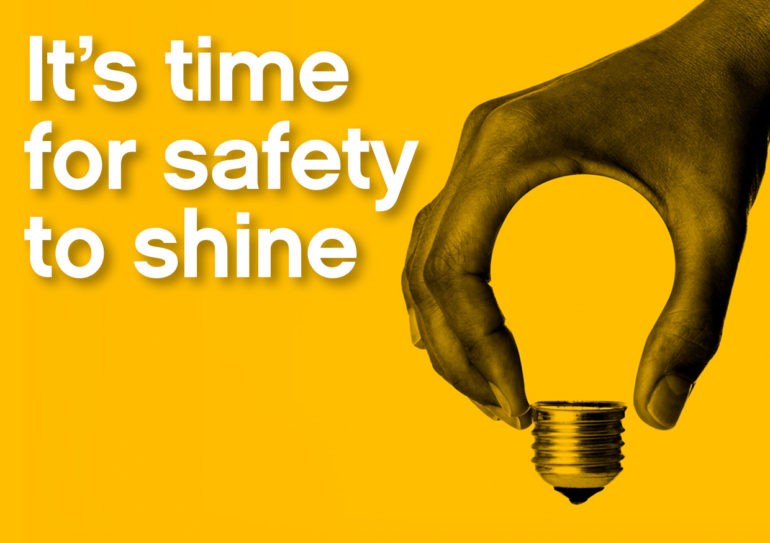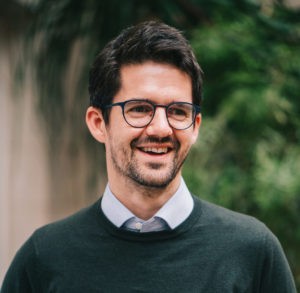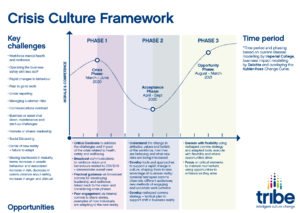Sponsored content
It’s time for safety to shine
As lockdown kicked in, no one saw the coronavirus crisis as an opportunity. But opinions can change, as the results of a latest Insight document reveal. In this article, Mark Ormond, Managing Director at Culture Change specialists Tribe, explains more about the findings.
 Early April, 10 days after lockdown began, a ‘zoomful’ of 100 HSE professionals came together on one screen to help answer the question on everyone’s minds: ‘What on Earth are we going to do now?’
Early April, 10 days after lockdown began, a ‘zoomful’ of 100 HSE professionals came together on one screen to help answer the question on everyone’s minds: ‘What on Earth are we going to do now?’
The Virtual Forum, hosted by Culture Change specialists, Tribe, kicked off an extensive research project, using data collected from 125 organisations so far, on the challenges they see related to the coronavirus crisis and how they’re dealing with them.

Mark Ormond, Managing Director of Tribe, came up with the idea after having similar conversations with clients from many different industries, all wanting to know what other companies were doing to cope with the crisis.
“Right from the start we knew that this was going to be the biggest shift in culture the world has ever seen,” says Mark. “We knew that everything would change, really quickly. Our clients are having to react to these changes at pace, creating daily risk, uncertainty and extensive business challenges.
“We saw that initially businesses were trying to hold on to their existing culture, but we wanted to understand how the crisis was going to change people’s attitudes, values and beliefs. Does a crisis like this increase the health and safety risk; does it become more problematic or do people actually become more risk aware?
“I looked back at any previous research I could find, such as the 2008 finance crash, to see what effect something like this could have, but I couldn’t find a definitive answer. It was clear that this was unlike anything we have ever seen before.
“We decided that pulling together our own research would be a great way to understand how we could support organisations through their challenges but also to help them grab any opportunity this crisis may bring.”
Challenges to health, safety and wellbeing during coronavirus

Crisis Culture Framework (Click to enlarge)
The key question for the company’s research was to ask respondents what their organisation’s main challenges to health, safety and wellbeing during this crisis were and how they are dealing with them.
From the responses, Tribe spent time plotting where companies were positioned on what they are calling the Crisis Culture Framework – based on the Kubler Ross Change Curve – which cites the initial Crisis phase, through to Acceptance phase and finally, phase three, Opportunity.
The Kubler Ross Change Curve has been used in many ways over the years. For those unfamiliar with the curve it’s a way of thinking about the shifts in attitudes, values and beliefs that people go through as things are changing, and how that might affect their motivation and decision making. This is something that Tribe will be looking to do throughout the length of the crisis and beyond.
Piecing together the findings, Tribe came up with some surprising insights, as Mark explains: “Initially, I thought that organisations would find health and safety very challenging – commercial challenges putting pressure on companies and employees for output at the expense of safety.
“However, in an unprecedented move, the Government pretty much stopped people from working; there were fewer working hours, limited work patterns, home working and people on furlough. Many companies, therefore, had time to focus on health, safety and particularly wellbeing, which, of course, is now more important than ever.
‘This is a health and safety moment’
“It’s surprising how ‘people focused’ companies have been,” says Mark. “This is a health and safety ‘moment’ – leaders have woken up to how important it could be if you get health and safety wrong and are working hard to make sure this doesn’t happen.
“What’s really interesting is that, for this reason, our clients are saying there is a very positive opportunity coming out of the crisis. No one saw it as an opportunity at the time, but now they do.”
Mark is keen to stress, however that while health and safety is being given the attention it deserves, there is a danger of complacency. “We must be careful of ‘COVID-19 blindness’; where we focus so much on coronavirus that we forget the other risks. This is something we are keen to work with our clients on to make sure this health and safety moment is sustainable in the future.”
The impact of technology
Another interesting observation coming out of Tribe’s research is the impact that technology, and even social media, is starting to have on the way health and safety is being managed.
“Despite the many benefits of our technological world, such as enabling home working, it also brings its own challenges,” Mark continues. “The obvious challenges are staff wellbeing, isolation and loneliness, but some of our clients have managers working from home, with the workforce out on site – how can these managers influence people when they can’t be face to face?”
Similarly, communication has changed – people at home can and do access a range of different communication channels. One of our clients told us how this is affecting how they are being forced to manage risks. Early on in the crisis, this particular company told its employees they were not going to be provided with masks or PPE as, according to the Government, there was no evidence that they were necessary.
“But when employees are hearing through social media that friends in other companies are being issued with masks, the decision makers came under pressure from employees and the organisation had to reverse its decision. Whether, this is a good or bad thing is a matter of opinion and it seems that, on this particular point, ‘official’ advice varies.’
“This throws up an interesting insight into the issue of control – who controls the decision making? In the face of continually changing government advice, alongside social media, organisations are having to chase decision making. How will this have an impact on safety culture moving forward?”
The impact of the coronavirus crisis
Tribe has carried out this research in order to understand the impact of the coronavirus crisis on people’s attitudes, values and beliefs, so what are Mark and his team going to do with these insights?
“We will use what we have learned to create a long-term conversation about culture, alongside adapting the work we do with organisations to make sure we can help them improve their health, safety and wellbeing performance for the years to come.
“Mindset is extremely important – you can’t ignore the anxiety that people are feeling and will continue to feel, in the light of the new COVID-19 world – but it can’t all be about COVID-19. It’s all a question of getting the right balance, using the lessons that the crisis is teaching us to create stronger, more resilient health, safety and wellbeing cultures.’
In an environment that is constantly changing, with people and organisations having to adapt at considerable pace, it seems that this may well be a fantastic opportunity for health, safety and wellbeing people to shine.
The latest version of Tribe’s Insight document is now available to download here.
Register for download Tribe’s most recent Virtrual Forum.
Could the new COVID risk mindset be a catalyst for change in safety culture?
A panel discussion where safety leaders will be discussing how they are harnessing the positive shift in peoples attitude to health and safety and finding ways to sustain it to drive a better culture for the new normal.
‘The crisis could pay great dividends for us as a profession’
The thoughts of Mark were echoed in a recent interview conducted by SHP with Neil Lennox, Head of Group Safety & Insurance at Sainsbury’s, who said: “As long as we’re sensible the crisis could pay great dividends for us as a profession”. Click here to read our interview with Neil in full.
Amanda Owen, Safety, Health and Wellbeing Director at Heathrow Airport has also expressed to SHP in recent weeks that: ‘Safety is going to help the recovery of the aviation sector’. Click here to learn about some of the practical and innovative solutions being implemented to eliminate and reduce risks, and to ensure passengers feel confident to fly again when the current coronavirus controls are lifted.
Finally, the topic of driving safety forward was also in a recent SHP webinar, entitled ‘State of the Health and Safety Profession and Adapting to the new world’, Chaired by Prof Dr Andrew Sharman, IOSH President, and featuring Ruth Denyer, Group Risk Director ITV, Karen McDonnell, Head of RoSPA Scotland and Lawrence Waterman, Chairman, British Safety Council. Click here to listen back to this safety & health webinar on-demand.
It’s time for safety to shine
As lockdown kicked in, no one saw the coronavirus crisis as an opportunity. But opinions can change, as the results of a latest Insight document reveal.
Safety & Health Practitioner
SHP - Health and Safety News, Legislation, PPE, CPD and Resources Related Topics
Safety Leadership: From virtual safety to real safety
British Safety Council Wellbeing Conference: Empowering Employees for Success
New flexible working legislation – what does it mean?

 Early April, 10 days after lockdown began, a ‘zoomful’ of 100 HSE professionals came together on one screen to help answer the question on everyone’s minds: ‘What on Earth are we going to do now?’
Early April, 10 days after lockdown began, a ‘zoomful’ of 100 HSE professionals came together on one screen to help answer the question on everyone’s minds: ‘What on Earth are we going to do now?’

An uplifting article, perhaps what many in the profession need right now? so thank you for finding sunshine in these cloudy times. Now I hate to bring the clouds back, however don’t you think that there is also a likelihood that workers be more reluctant to report safety concerns and issues due to fear of reprisals in tough jobs market? Unsafe behaviours, conditions and near misses can have significant injury causing potential, if reporting stops or slows accidents may increase. So its possible safety professionals may have to compromise to a greater degree than they’d like. Of course… Read more »
Thanks for your reply Phil, Following our panel discussion on this topic, we heard from senior leaders that there are definitely some positive green shoots coming out of the crisis – but they were also quick to point out that this new more positive risk mindset could be a short-term phenomenon. They are already seeing slippage. After a good start, incidents and accidents are on the increase again. It’s becoming clear that we need to act with pace to harness the positive swing in risk attitude, so that people don’t slip back into “normal” rather than a “new normal.” Ive… Read more »